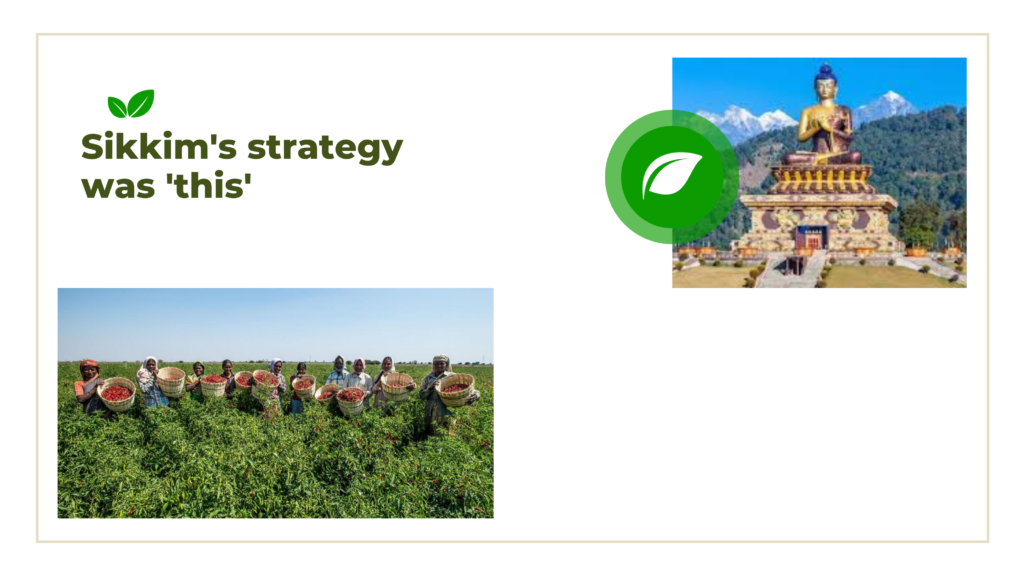Organic Farming : Grain is one of our most basic needs. Due to the Green Revolution that took place in Indian history in the 1960s, we had accumulated sufficient grain reserves, but along with this, chemical fertilizers and pesticides had also entered our country.
Green Revolution not only increased production but it also started affecting our agriculture, water, air and land.
Now in this situation organic farming is being promoted. Sikkim of India is the first state in the world where completely organic farming is done.
Today Sikkim has become an example for the whole world. For its immense success, Sikkim has also been awarded the Oscar for Best Policies by the United States.
In such a situation, it would be interesting to know what is organic farming? Following which policies did Sikkim make itself a 100 percent organic state-
Table of Contents
The World’s first organic state?
Sikkim is the world’s first organic state. In 2003, Sikkim adopted a resolution to switch to organic farming, and by 2016, it had achieved its goal of becoming 100% organic. This means that all of Sikkim’s farmland is certified organic, and no chemical fertilizers or pesticides are used.
Sikkim’s transition to organic farming has been a success, both for the environment and for the state’s economy. Organic farming has helped to improve the quality of Sikkim’s soil and water, and it has also led to an increase in crop yields. In addition, Sikkim’s organic produce is in high demand, both domestically and internationally, which has boosted the state’s economy.
Sikkim’s achievement is a significant one, and it has set an example for other states and countries around the world. Sikkim’s success shows that it is possible to transition to organic farming on a large scale, and that the benefits of organic farming are significant for both the environment and the economy.
United Nations Awarded
In the year 2003, the State Government of Sikkim resolved to transform into an organic state. After which, in the year 2016, due to its policies and efforts, Sikkim was declared the world’s first organic state.
For this, the Fertilizer and Agriculture Organization (FAO) of the United States gave Sikkim the Oscar Award for its best policies. Hundred percent organic farming is done here. UN gave this title to Sikkim by defeating about twenty-five nominated states.
66,000 farmers benefited from organic farming. Not only this, due to this, tourism in Sikkim has increased by about 50 percent today. This increase was seen between 2014 and 2017.
While giving this award, the United States had described Sikkim’s steps in fighting hunger and poverty and protecting the environment.

Organic farming in Sikkim?
Organic farming is an evergreen ancient method by which the environment remains pure and the natural form of the land is also maintained. With its use, the soil remains fertile and one does not have to face problems like drought.
In organic farming, fossil fertilizers are used instead of chemical fertilizers. Also, organic fertilizers are used instead of weed pesticides.
Cow dung, compost, green manure, bio-pesticide, vermicompost, neem cake, lemon grass and fruit residues are used in organic farming. Bacterial culture is followed in this.
Sikkim’s strategy was ‘this’
To make Sikkim an organic state, 75 thousand hectares of land was converted into organic. The then Chief Minister Pawan Chamling started this scheme 15 years ago.
For this, emphasis was laid on the use of organic rather than chemical pesticides. In this action plan, Sikkim government banned chemical fertilizers and pesticides.
Also, violation of this law can result in imprisonment of up to three months along with a fine of Rs 1 lakh.

For this he also formed the Sikkim State Board. Partnerships were also made with many agricultural development and research institutions in the country and abroad. It also included biological research from Switzerland.
Organic farming was done on 8 lakh 35 thousand hectares of land in Sikkim, which has benefited about 4 lakh farmers.
Initially a target was set to cover 50 thousand hectares of land, about two and a half thousand farmer interest groups were formed through which about 45 thousand farmers joined the organic scheme.
Emphasis was laid on developing village panchayats as clusters for organic farming. This is how Sikkim’s planning worked.
Resolved to convert into bio-village
Awareness was spread about organic farming. For this, people were made aware of organic fertilizers by visiting organic farms, organic schools and door-to-door. Besides, nutrition management, technology, pest management and laboratories for farming were also started.
Apart from this, run many awareness campaigns including acidic land treatment, organic packing. Interestingly, Sikkim was witnessing a decline in its income and production, after which the state had decided to shift to organic farming.
The path to transforming into a completely organic state was not easy. For this, the state government first adopted villages and resolved to convert them into bio-villages.
After that the quota given for fertilizers was stopped and organic fertilizers were made available to everyone. Besides, people were also given organic certificates for farming.
After taking all these steps, the scope of farming in Sikkim increased. More than 22 lakh hectares were produced there.
There are many benefits of organic farming
Nowadays, organic farming is becoming increasingly popular. The whole world including India is adopting it. Since its benefits are so many that it not only protects the environment but also provides better grains to us humans.
Organic farming protects the insects friendly to farming. This increases the ground water level. Besides, the most important thing is that along with reducing the agricultural cost, the quality of production also increases.
Due to this, ecology including balance farming works well. Crop rotation is followed so that they get proper nutrition.
According to statistics, a farmer is able to utilize only 25 to 40 percent of his crop. At the same time, 600 billion tons of agricultural residues are burnt to prepare their fields for growing new crops again.
By the year 2025, the business of organic farming in the country is estimated to be around Rs 75 thousand crore. In such a situation, there is a need to provide training to people regarding organic farming along with the use of modern technologies.
Since this starts happening on a large scale then the sales and purchases related to it are also likely to increase in the market.
